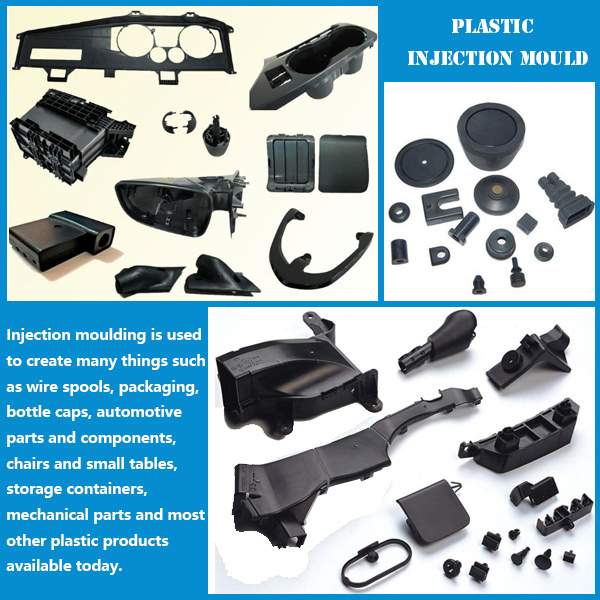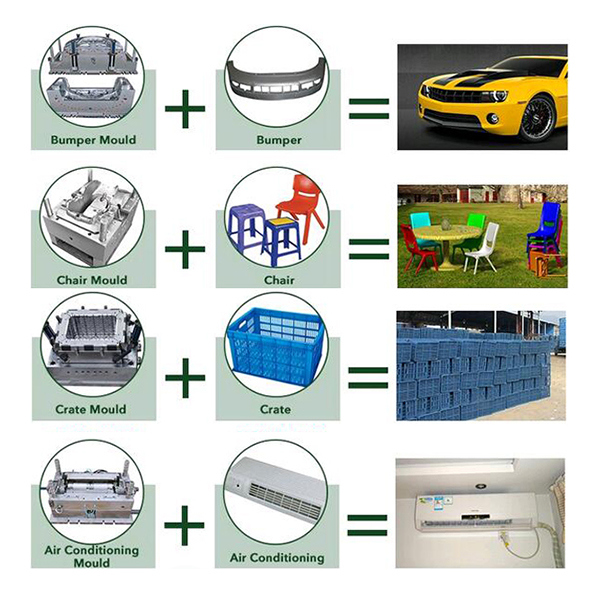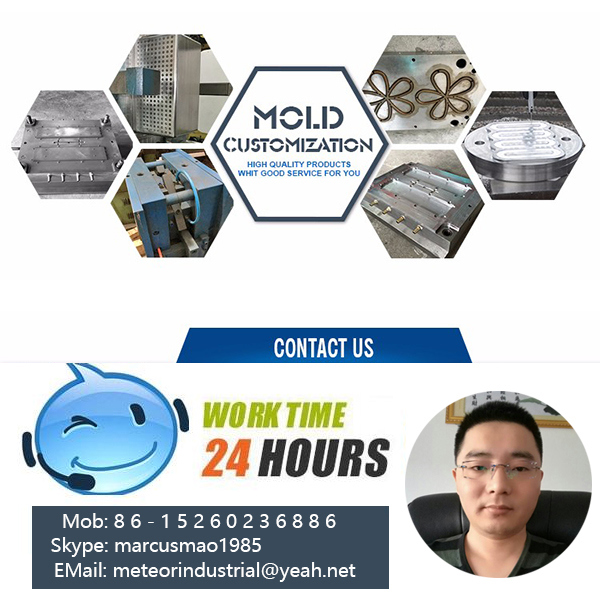
Plastic Injection Molds Parts Service
Xiamen Meteor offers more injection molds parts design and manufacturing service, we have more 10+ experience in injection molds field. All of projects we will put them from DFM to PFM working flow to ensure products quality, from molds design, mold flow analysis, per-mold machining review a series of testing reports to make sure mold production running smoothly. We are proud of our mold producing flowing, product quality guarantee, delivery on time and we have professional engineer team to support your projects, make it so easy, make you so comfortable.

Plastic Mold Design Guidelines
Size
The maximum part outline that can be molded is approximately 18.9 in. (480mm) by 29.6 in. (751mm) or roughly equivalent to 175 sq. in. (1,129 sq. cm.). A maximum part volume of approximately 59 cu. in. Depth up to 4 in. (101mm) from the parting line with 3 degrees of draft, or up to 8 in. (202mm) total if the parting line can pass through the middle of the part, inside and outside. Deeper parts are limited to a smaller outline.
Draft
A taper applied to the faces of the part that prevent them from being parallel to the motion of the mold opening is called draft. This keeps the part from being damaged due to scraping as the part is ejected out of the mold. Recommended draft:
0.5 degrees on all vertical faces is strongly advised.
2 degrees works very well in most situations.
3 degrees is minimum for a shutoff (metal sliding on metal).
3 degrees is required for light texture (PM-T1).
5 or more degrees is required for heavy texture (PM-T2).
Tolerances
Typically, Proto Labs can maintain a machining tolerance of ±.003 in. (0.08mm) with an included resin tolerance that can be greater than but no less than ±.002 in./in. (0.002mm/mm).
Wall thickness
With injection-molded parts, observing proper (and uniform) wall thickness helps parts avoid potential issues such as sink marks and warpage. Recommended thicknesses vary by material:
| Resin | Inches |
| ABS | 0.045 - 0.140 |
| Acetal | 0.030 - 0.120 |
| Acrylic | 0.025 - 0.500 |
| Liquid crystal polymer | 0.030 - 0.120 |
| Long-fiber reinforced plastics | 0.075 - 1.000 |
| Nylon | 0.030 - 0.115 |
| Polycarbonate | 0.040 - 0.150 |
| Polyester | 0.025 - 0.125 |
| Polyethylene | 0.030 - 0.200 |
| Polyphenylene sulfide | 0.020 - 0.180 |
| Polypropylene | 0.025 - 0.150 |
| Polystyrene | 0.035 - 0.150 |
| Polyurethane | 0.080 - 0.750 |
Surface finish
A number of standard finishes are available for injection-molded parts at Proto Labs. Our current finishes include non-cosmetic, low-cosmetic and EDM finishes; bead-blast texturing; and high-end mold polishing.Standard finishes (from least to most costly):
| PM-F0: | Non-cosmetic: finish to Protomold discretion |
| PM-F1: | Low-cosmetic: most toolmarks removed |
| PM-F2: | Non-cosmetic: Protomold discretion, EDM finish and/or toolmarks permissible |
| SPI-C1: | 600 grit stone, 10-12 Ra |
| PM-T1: | Protomold texture, SPI-C1 followed by light bead blast |
| PM-T2: | Protomold texture, SPI-C1 followed by medium bead blast |
| SPI-B1: | 600 grit paper, 2-3 Ra |
| SPI-A2: | Grade #2 Diamond Buff, 1-2 Ra |
*"PM" in the table signifies a surface finish adjusted to fit the quick-turn injection molding process, where SPI (The Society of the Plastics Industry) denotes an industry-standard finish.
Radii
Because Proto Labs employs an automated CNC milling process to make the mold for your parts, some part corners will end up with a radius rather than a sharp edge. This does not usually require a change to the model, but the designer is made aware of these radii before the mold is made.Ejector pins
Proto Labs' injection molding process uses ejector pins of various sizes to push the plastic part out of the mold after it has solidified. The sizes and arrangement of these pins are selected to minimize the impact on your part design. Ejector pins range in size from 0.063 in. (1.6mm) to 0.5 in. (12.7mm), with sizes larger than 0.063 in. (1.6mm) preferred.Undercuts
Our molding process supports simple undercuts in your part geometry. Maximum side core dimensions:| Width | Height | Pull |
| ≤ 8.419 in | ≤ 2.377 in | ≤ 2.900 in |
| ≤ 213.84mm | ≤60.38mm | ≤73.66mm |
Materials
Proto Labs stocks hundreds of thermoplastic resins for injection molding that offer a variety of benefits for many different applications and industries. See full list of materials.- ABS
- ABS/PC
- Acetal
- Acetal Copolymer
- Acetal Homopolymer
- ETPU
- HDPE
- LCP
- LDPE
- LLDPE
- Nylon 6
- Nylon 6/12
- Nylon 66
- PBT
- PC/PBT
- PEEK
- PEI
- PET
- PETG
- PMMA
- Polycabonate
- Polypropylene
- PPA
- PPE/PS
- PPS
- PS
- PSU
- SB
- TPE
- TPU
- TPV

 Customized Plastic Bicycle/Auto Spare Parts Machine Parts Plastic Injection Mould Plastic Mold Design Mold Development Mold Processing Mold Injection

Plastic Injection Molds Parts Service
Xiamen Meteor offers more injection molds parts design and manufacturing service, we have more 10+ experience in injection molds field. All of projects we will put them from DFM to PFM working flow to ensure products quality, from molds design, mold flow analysis, per-mold machining review a series of testing reports to make sure mold production running smoothly. We are proud of our mold producing flowing, product quality guarantee, delivery on time and we have professional engineer team to support your projects, make it so easy, make you so comfortable.

Plastic Mold Design Guidelines
Size
The maximum part outline that can be molded is approximately 18.9 in. (480mm) by 29.6 in. (751mm) or roughly equivalent to 175 sq. in. (1,129 sq. cm.). A maximum part volume of approximately 59 cu. in. Depth up to 4 in. (101mm) from the parting line with 3 degrees of draft, or up to 8 in. (202mm) total if the parting line can pass through the middle of the part, inside and outside. Deeper parts are limited to a smaller outline.
Draft
A taper applied to the faces of the part that prevent them from being parallel to the motion of the mold opening is called draft. This keeps the part from being damaged due to scraping as the part is ejected out of the mold. Recommended draft:
0.5 degrees on all vertical faces is strongly advised.
2 degrees works very well in most situations.
3 degrees is minimum for a shutoff (metal sliding on metal).
3 degrees is required for light texture (PM-T1).
5 or more degrees is required for heavy texture (PM-T2).
Tolerances
Typically, Proto Labs can maintain a machining tolerance of ±.003 in. (0.08mm) with an included resin tolerance that can be greater than but no less than ±.002 in./in. (0.002mm/mm).
Wall thickness
With injection-molded parts, observing proper (and uniform) wall thickness helps parts avoid potential issues such as sink marks and warpage. Recommended thicknesses vary by material:
| Resin | Inches |
| ABS | 0.045 - 0.140 |
| Acetal | 0.030 - 0.120 |
| Acrylic | 0.025 - 0.500 |
| Liquid crystal polymer | 0.030 - 0.120 |
| Long-fiber reinforced plastics | 0.075 - 1.000 |
| Nylon | 0.030 - 0.115 |
| Polycarbonate | 0.040 - 0.150 |
| Polyester | 0.025 - 0.125 |
| Polyethylene | 0.030 - 0.200 |
| Polyphenylene sulfide | 0.020 - 0.180 |
| Polypropylene | 0.025 - 0.150 |
| Polystyrene | 0.035 - 0.150 |
| Polyurethane | 0.080 - 0.750 |
Surface finish
A number of standard finishes are available for injection-molded parts at Proto Labs. Our current finishes include non-cosmetic, low-cosmetic and EDM finishes; bead-blast texturing; and high-end mold polishing.Standard finishes (from least to most costly):
| PM-F0: | Non-cosmetic: finish to Protomold discretion |
| PM-F1: | Low-cosmetic: most toolmarks removed |
| PM-F2: | Non-cosmetic: Protomold discretion, EDM finish and/or toolmarks permissible |
| SPI-C1: | 600 grit stone, 10-12 Ra |
| PM-T1: | Protomold texture, SPI-C1 followed by light bead blast |
| PM-T2: | Protomold texture, SPI-C1 followed by medium bead blast |
| SPI-B1: | 600 grit paper, 2-3 Ra |
| SPI-A2: | Grade #2 Diamond Buff, 1-2 Ra |
*"PM" in the table signifies a surface finish adjusted to fit the quick-turn injection molding process, where SPI (The Society of the Plastics Industry) denotes an industry-standard finish.
Radii
Because Proto Labs employs an automated CNC milling process to make the mold for your parts, some part corners will end up with a radius rather than a sharp edge. This does not usually require a change to the model, but the designer is made aware of these radii before the mold is made.Ejector pins
Proto Labs' injection molding process uses ejector pins of various sizes to push the plastic part out of the mold after it has solidified. The sizes and arrangement of these pins are selected to minimize the impact on your part design. Ejector pins range in size from 0.063 in. (1.6mm) to 0.5 in. (12.7mm), with sizes larger than 0.063 in. (1.6mm) preferred.Undercuts
Our molding process supports simple undercuts in your part geometry. Maximum side core dimensions:| Width | Height | Pull |
| ≤ 8.419 in | ≤ 2.377 in | ≤ 2.900 in |
| ≤ 213.84mm | ≤60.38mm | ≤73.66mm |
Materials
Proto Labs stocks hundreds of thermoplastic resins for injection molding that offer a variety of benefits for many different applications and industries. See full list of materials.- ABS
- ABS/PC
- Acetal
- Acetal Copolymer
- Acetal Homopolymer
- ETPU
- HDPE
- LCP
- LDPE
- LLDPE
- Nylon 6
- Nylon 6/12
- Nylon 66
- PBT
- PC/PBT
- PEEK
- PEI
- PET
- PETG
- PMMA
- Polycabonate
- Polypropylene
- PPA
- PPE/PS
- PPS
- PS
- PSU
- SB
- TPE
- TPU
- TPV

Â
INCONEL®
Yuhong Group supplies Inconel® alloys C-276, HX, 22, 600, 601, 625 & 718 in the form of Plate, Sheet, Bar, Wire, Pipe, Tubing, Pipe Fittings, Flanges and Electrode.
The registered trademark name, Inconel, is applied as the prefix name to more than twenty different highly corrosion resistant high temperature strength metal alloys produced by Special Metals Corporation. These Inconel alloys or superalloys are nickel-based alloys that exhibit traits such as high resistance to corrosion, oxidation, carburization, pitting, crevice, corrosion cracking, and high temperature strength. Often, Inconel is referred to as [Inco".
Alloys of identical chemical and mechanical properties are available from other manufacturers and offer excellent alternativesto the various Inconel® brand alloys.
The corrosion-resistant superalloys are widely used in extreme environments where tremendous heat and corrosion resistance is paramount to the integrity of the end product. Chemical processing, nuclear, petrochemical, aerospace and marine industries widely use these superalloys.
What are the Characteristics of Inconel ?
Good resistance to acids, such as sulfuric, phosphoric, nitric, and hydrochloric
Almost completely free from chloride induced stress corrosion cracking
Excellent mechanical properties at both extremely low and extremely high temperatures
Outstanding resistance to pitting, crevice corrosion and intercrystalline corrosion
High resistance to oxidation at elevated temperatures
In what Applications are Inconel alloys used ?
Chemical and petrochemical processing
Components where exposure to high mechanical stress and sea water are required
Flare stacks on offshore oil platforms
Gas turbines, rocket motors/engines, and space craft
Pollution control equipment
Nuclear reactors
Inconel Flange,Inconel 625 Flange,Inconel 600 Flange
YUHONG GROUP CO.,LIMITED , https://www.alloypipeline.com